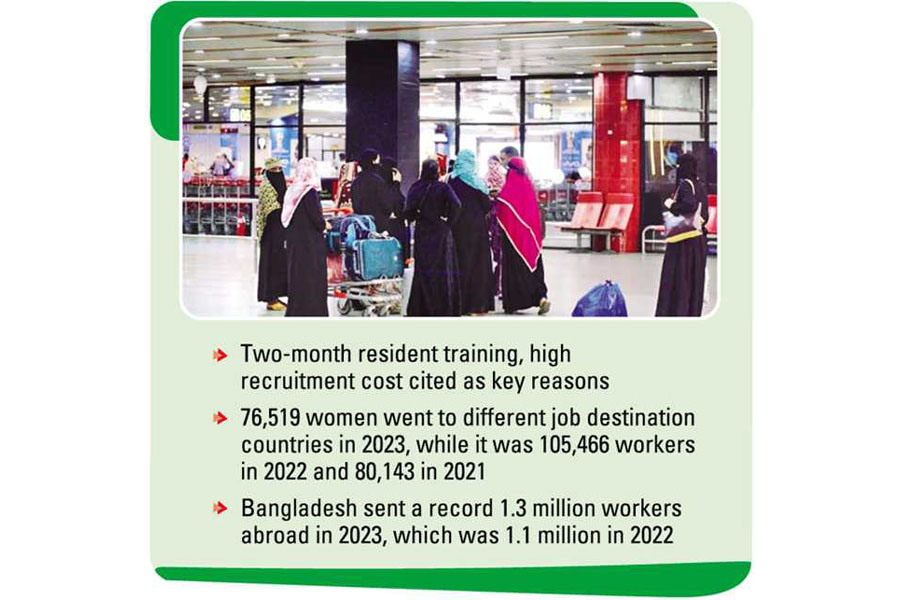
Published :
Updated :

Female labour migration from Bangladesh fell to a three-year low in the 2023 calendar year, although the country set a record for sending overall workers abroad.
According to BMET data, 76,519 women went to different job destination countries in 2023, while it was 105,466 workers in 2022 and 80,143 in 2021.
Besides, in five years before the outbreak of Covid-19, more than 100,000 women went abroad each year.
The limited outflow of women workers to Saudi Arabia is reflected in the overall women migration, according to officials and manpower recruitment agencies.
Statistics showed the kingdom hired 50,254 women workers from Bangladesh in 2023 and 70,279 in 2022.
The migration process for women is lengthy as Bangladesh introduced two-month resident training months ago which, according to recruiters, was a major reason behind this dwindling number of jobs in 2023.
Saudi Arabia and other Middle-Eastern states do not want to take more time to hire such domestic helps.
However, Bangladesh sent a record 1.3 million workers abroad in 2023, which was 1.1 million in 2022.
Md Tipu Sultan, joint secretary general of the Bangladesh Association of International Recruiting Agencies (BAIRA), said Saudi employers reduced hiring workers from here for a lengthy migration process.
Saudi Arabia recruits women as domestic help from foreign countries, including Bangladesh, through the 'Musaned' system, he told the FE.
Musaned is a digital platform for recruiting domestic aids within 45 days.
"Recruiters often miss the deadline as a two-month mandatory resident training system has been introduced for women by the government recently."
About 100,000 women go abroad with jobs a year, but the technical training centres (TTCs) cannot be admitted as per the demand, according to Mr Sultan. The outflow of women workers from Bangladesh to other Arab nations also declined during the last year.
Bangladesh could send 6,547 women to Oman, another major hub for Bangladeshis, but the Arab country recently suspended taking workers from here.
Oman recruited 16,544 in 2022.
Qatar hired 1095 in 2023, while 1982 in 2022.
Jordan, which hires mostly apparel workers from Bangladesh, decreased recruitment to 7,838 in 2023 from 11,879 in 2022 following the impact of the Russia-Ukraine war, the data found.
"…Saudi Arabia, the largest market for Bangladeshi women, is hiring more workers from other countries like Nepal, Sri Lanka and some African countries, including Ghana, Rwanda, Ethiopia, Sudan and Kenya."
Mr Sultan, proprietor of Rajdhani Trade International, said Saudi employers could bring workers from African countries in a week or two. So, they are giving priority to those countries.
BMET sources said the two-month resident training was made mandatory for women workers about six months ago.
Earlier, it was a one-month training programme.
As a result, there is a capacity shortage in the training centres, but housekeeping trade will be introduced in 42 more TTCs shortly.
The bureau currently runs 101 TTCs and will launch three others soon. Of the total, 40 have a two-month housekeeping course.
A senior BMET official said recruiters used to try to get fake certificates in the past. There is no chance to get certificates without training at present.
"They are giving priority to sending quality workers rather than quantity," he told the FE.
Recruiters also cited other reasons for the decrease in the number of women workers as women often did not want to take long training.
"The long-term negative campaign about female migration to Saudi Arabia has also had an impact."
On the other hand, it costs more for employers to get women workers from Bangladesh as the airfare is high.
It takes Tk 60000 to Tk 80000 as airfare to send a worker from the country, but African countries or Sri Lanka send workers with only Tk 20000.
Middle-Eastern employers bear all costs of recruitment to hire women for domestic help from Bangladesh.
Employers need to pay $4,000 for a Filipino woman worker, $2500 for a Bangladeshi and $900-1,000 for an African woman, according to the recruiters.
Bangladesh Nari Sramik Kendra executive director Sumaiya Islam said it was necessary to improve the quality rather than extending the training duration.
"Potential domestic help should be trained as per the demands of the labour-receiving countries."
She said the agreement with Saudi Arabia and the decisions taken in the joint technical committee meetings in sending women should be fulfilled because they still face various problems in the workplace.
According to the BMET, 104,786 women found overseas jobs in 2019, 101,695 in 2018, 121,925 in 2017, 118,088 in 2016 and 103,718 in 2015.
However, only 21,934 women were able to go abroad in 2020 as labour-receiving countries suspended hiring manpower following the pandemic.
Bangladesh has sent an estimated 1.1 million women workers abroad since 1991.
Although women generally earn less than men, they send home about 80 per cent of their hard-earned remittance, according to a study by the UN Women in 2018.
arafataradhaka@gmail.com


 For all latest news, follow The Financial Express Google News channel.
For all latest news, follow The Financial Express Google News channel.